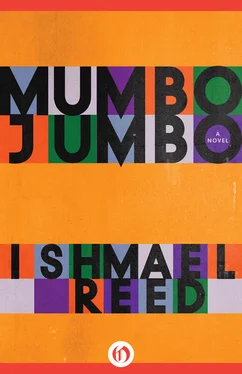Ishmael Reed - Mumbo Jumbo
Здесь есть возможность читать онлайн «Ishmael Reed - Mumbo Jumbo» весь текст электронной книги совершенно бесплатно (целиком полную версию без сокращений). В некоторых случаях можно слушать аудио, скачать через торрент в формате fb2 и присутствует краткое содержание. Год выпуска: 2013, ISBN: 2013, Издательство: Open Road Media, Жанр: Современная проза, на английском языке. Описание произведения, (предисловие) а так же отзывы посетителей доступны на портале библиотеки ЛибКат.
- Название:Mumbo Jumbo
- Автор:
- Издательство:Open Road Media
- Жанр:
- Год:2013
- ISBN:9780684824772
- Рейтинг книги:5 / 5. Голосов: 1
-
Избранное:Добавить в избранное
- Отзывы:
-
Ваша оценка:
- 100
- 1
- 2
- 3
- 4
- 5
Mumbo Jumbo: краткое содержание, описание и аннотация
Предлагаем к чтению аннотацию, описание, краткое содержание или предисловие (зависит от того, что написал сам автор книги «Mumbo Jumbo»). Если вы не нашли необходимую информацию о книге — напишите в комментариях, мы постараемся отыскать её.
Mumbo Jumbo
Mumbo Jumbo
Mumbo Jumbo — читать онлайн бесплатно полную книгу (весь текст) целиком
Ниже представлен текст книги, разбитый по страницам. Система сохранения места последней прочитанной страницы, позволяет с удобством читать онлайн бесплатно книгу «Mumbo Jumbo», без необходимости каждый раз заново искать на чём Вы остановились. Поставьте закладку, и сможете в любой момент перейти на страницу, на которой закончили чтение.
Интервал:
Закладка:
It all came down to Kipling’s vision. They all, Left, Right, etc., wanted to wear their pith helmets riding on their cultural elephants but Sabu no longer wished to be their guide.
But now this pitiful creature who said something about “Black Studies so much blackeyed peas” had to stand on the soapbox as the Religious Atonist had before. Lecturing on Freud and Marx and all the old names. He resembled the embarrassed gargoyle dismayed and condemned to watch his former worshipers pass him by as they went into the centers of Jes Grew. Pagan Mysteries.
Sometimes he would yammer on and on about his mother and dad in the garment district and how hard it was for them. Everyone should be sheltered, fed, there was no disagreement about the body. It was what to do about the head.
LaBas felt everybody should have their own head or the head of God which the Atonist’s mundane “system” wouldn’t admit. Homo economicus. The well-fed the will-less robot who yields his head to the Sun King. The sad old creature wanted the Jes Grew Carriers to have his head. Cut out this Jes Grew that keeps a working man up to all hours of the night with its carryings on. The Ballyhoo of its Whoopie. Its Cab Calloway hidihidiho.
He wanted them to have his head. An Atonist head. While LaBas wanted them to have the heads their people had left for them or create new ones of their own. A library of stacks a 1000 miles long. Therefore he and PaPa LaBas disagreed about what to do with the head, not the body.
PaPa LaBas attempted to ignore this ideological tramp but wasn’t able to; the man followed him out to the automobile parking lot.
LaBas, why do you mystify your past? These youngsters need something palpable. Not this bongo drumming called Jes Grew.
Bongo drumming requires very intricate technique. A rhythmic vocabulary larger than French English or Spanish, the 1-time vernacular languages.
Come now, the old man smiles. Come now, PaPa LaBas.
The man stands next to the driver’s window as PaPa LaBas climbs into his automobile. The man puffs on his pipe. The man’s face is bloated. Sanguine.
Each year the students would invite PaPa LaBas to the campus to discuss the Harlem Renaissance. After all, he had attended this “Negro Awakening.” The Cabarets, the Speaks, and he knew the many painters, show people, film makers. He knew Park Ave. as well as those on Striver’s Row. He went to the celebrations at Irvington-on-Hudson as well as to the Chitterling Switches. But the children seemed more interested in the fact that he was 100 years old than anything else.
PaPa LaBas begins the electric starter. One of the gas lamps was broken. The beautiful interior furnishings faded. The French telephone removed long ago.
The man is still standing there. The strange wounded expression. Do aging anteaters smile?
PaPa LaBas, you must come clean with those students. They must have a firm background in the Classics. Serious works, the achievements of mankind which began in Greece and then sort of wiggled all over the place like a chicken with its neck wrung. (He had once written in a private interview that he didn’t know whether to dismiss Jes Grew or go with it. His language reflected this indecision.)
PaPa LaBas continues to ignore the man. He wants to get home, they are having greens and hog’s head to celebrate the Holiday.
Will you please move over?
The car jolts forward. The 1914 Locomobile Town Coupe has by this time developed a mind of its own. The man crashes to the pavement of the parking lot like a sandbag. His glasses are sprawled on the ground in front of him. He doesn’t appear to be hurt because he lifts himself from the pavement and begins a ponderous trot in pursuit of the car. He stops and clutches his chest as if in pain.
PaPa LaBas watches him in his rearview mirror as the man, a sad figure, turns and slowly walks toward the campus. He would sleep there under an elm until the next morning when he would climb on the soapbox and harangue about Freud Marx Youth, etc. etc. The man himself a relic from another age like the 1 letter in the neon sign that is off the blink. The poor frumpy, frowzy, man. He wouldn’t last long. Couldn’t be more than 70–75. A mere youngster. PaPa LaBas steers the car over the bridge. He saw the lights of Manhattan. Chuckling to himself he thought of the lecture: the flights of fancy, the tangential excursions, a classroom that knew what he was talking about.
People in the 60s said they couldn’t follow him. (In Santa Cruz the students walked out.) What’s your point? they asked in Seattle whose central point, the Space Needle, is invisible from time to time. What are you driving at? they would say in Detroit in the 1950s. In the 40s he haunted the stacks of a ghost library. In the 30s he sought to recover his losses like everybody else. In the 20s they knew. And the 20s were back again. Better. Arna Bontemps was correct in his new introduction to Black Thunder. Time is a pendulum. Not a river. More akin to what goes around comes around. (Locomobile rear moving toward neoned Manhattan skyline. Skyscrapers gleam like magic trees. Freeze frame.)
Jan. 31st, 1971 3:00 P.M.
Berkeley, California
* “The Complications of American Psychology,” first published (1930) as “Your Negroid and Indian Behavior”—Carl G. Jung.
Partial Bibliography
1. Abraham, Hilda C., and Ernst L. Freud, eds. The Letters of Sigmund Freud and Karl Abraham, 1907–1926. New York: Basic Books, 1965.
2. The Ancient Book of Formulas. New York: Dorene Publishing, 1940.
3. Bassett, Margaret. Profiles and Portraits of American Presidents and Their Wives. New York: Grosset & Dunlap, 1969.
4. Bauer, W. W. Contagious Diseases. New York: Knopf, 1934.
5. Beradt, Charlotte. The Third Reich of Dreams. Chicago: Quadrangle Books, 1968.
6. Berger, Meyer. The Story of the New York Times, 1851–1951. New York: Simon & Schuster, 1951.
7. Blavatsky, H. P. Isis Unveiled. 2 vols. Point Loma, Cal.: Theosophical University Press, 1936.
8. Brill, Dr. A. A., ed. The Basic Writings of Sigmund Freud. New York: Modern Library, 1938.
9. Brome, Vincent. Freud and His Early Circle. New York: Morrow, 1968.
10. Brunn, H. O. Story of the Original Dixieland Jazz Band. Baton Rouge, La.: Louisiana State University Press, 1960.
11. Budge, E. A. Wallis. Osiris: The Egyptian Religion of Resurrection. New York: University Books, 1961.
12. Bulfinch’s Mythology.
13. Burland, C. A. The Exotic White Man. New York: McGraw-Hill, 1969.
14. Cass, Donn A. Negro Freemasonry and Segregation. Chicago: Powner, an Ezra A. Cook Publication, 1957.
15. Castle, Irene. Castles in the Air. New York: Doubleday, 1957.
16. Castle, Mr. and Mrs. Vernon. Modern Dancing. New York: The World Syndicate Co., 1914.
17. Chang, Chung-yuan. Creativity and Taoism: A Study of Chinese Philosophy, Art & Poetry. New York: Julian Press, 1963.
18. Charters, Ann. Nobody: The Story of Bert Williams. New York: MacMillan, 1970.
19. Charters, Samuel. The Poetry of the Blues. New York: Avon Books, 1970.
20. — and Leonard Kunstadt. Jazz: A History of the New York Scene. New York: Doubleday, 1962.
21. Christman, Henry M., ed. The American Journalism of Marx and Engels: A Selection from the New York Daily Tribune. New York: New American Library, 1966.
22. Churchill, Allen. Remember When. New York: Western Publishers, Golden Press, 1967.
23. — The Year the World Went Mad. New York: Crowell, 1960.
Читать дальшеИнтервал:
Закладка:
Похожие книги на «Mumbo Jumbo»
Представляем Вашему вниманию похожие книги на «Mumbo Jumbo» списком для выбора. Мы отобрали схожую по названию и смыслу литературу в надежде предоставить читателям больше вариантов отыскать новые, интересные, ещё непрочитанные произведения.
Обсуждение, отзывы о книге «Mumbo Jumbo» и просто собственные мнения читателей. Оставьте ваши комментарии, напишите, что Вы думаете о произведении, его смысле или главных героях. Укажите что конкретно понравилось, а что нет, и почему Вы так считаете.












